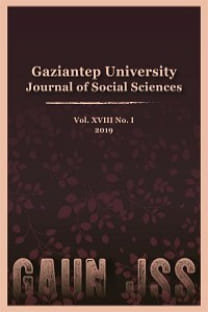Orwell’in Coming Up for Air, Animal Farm ve Nineteen Eighty-Four adlı Eserlerine Psiko-Analitik Bakış
Bu makalenin amacı, George Orwell’in romanlarında küresel tehditleri psikoanalitik eleştirel bağlamda yarattığı zihinsel ve psikolojik sorunları Coming up for Air (1939), Animal Farm (1945) ve Nineteen Eighty-Four (1949) adlı romanlarda değerlendirmek olacaktır. Artan küresel krizler, finansal, ekonomik, ve sosyal açıdan farklı gerilimlere sebep olmaktadır. Oluşan global gerilimlerin bozulan sosyo-ekonomik düzende insan psikolojisine ve değerlerine olumsuz yönde etki yaptığı görülmektedir. Global risklerin insanlar üzerindeki etkileri düşünüldüğünde, edebi eleştiride psikoanalizin rolü gözardı edilemez. Orwell’in eserlerinde apokaliptik değerlendirmeler yapılmasının sebebi gelişen dünya savaşlarıdır. Orwell’in belirtilen üç romanı, modern dünyada artan çekişmeler ve savaşlardan dolayı oluşan karamsar havayı ve çekişmeleri ortaya koymaktadır. Orwell eserlerinde, modern dünyada insanların yaşadğı endişe, belirsizlik, anlamsızlık, yabancılaşma, yalnızlaşma ve uzaklaşma gibi ruhsal bozuklukları sergilemektedir. Buna ek olarak, Orwell romanlarında dolaylı olarak, insanların yaşadığı psikolojik gerilimlerden dolayı sisteme karşı tutum ve davranışlar sergilediğini anlatmaktadır
Anahtar Kelimeler:
George Orwell, Global Tehlikeler, Dünya Savaşları, Soğuk Savaş Öncesi Dönem, İnsan Psikolojisi
Psychoanalitical Outlook for Orwell’s Coming Up for Air, Animal Farm and Nineteen Eighty-Four
This article highlights a psychoanalytical approach while assessing how world wars cause mental and psychological disorders in human beings in respect to George Orwell’s Coming up for Air (1939), Animal Farm (1945) and Nineteen Eighty-Four (1949). Rising global risks result in different forms of tension in financial, economic, and social respects. The atmosphere of perpetual crisis is influential on human psychology and personal values in worsening socio-economic circumstances. The role of psychoanalysis in literary criticism cannot be disregarded because of the rising global risks’ influence on human beings. The chaos of World Wars is the reason for Orwell to portray an apocalyptic analysis in his fictional works. Orwell’s aforementioned three novels in question here reveal a dark undertone of war and conflicts and manifest Orwell’s tendency to portray individuals having anxiety, uncertainty, meaninglessness, alienation, and isolation in the modern world. Moreover, Orwell indirectly depicts that such psychological tensions end up rebellious activities of human beings in his novels
Keywords:
George Orwell, Global Risks, World Wars, Pre-Cold War Period, Human Psychology,
___
- Baldick, Chris. (1996). Criticism and Literary Theory: 1890 to the Present. London: Pearson Education.
- Barry, Peter. (2009). Beginning Theory: An Introduction to Literary and Cultural Theory. III. Ed. Manchester: Manchester University Press.
- Davies, Alistair and Alan Sinfield, (Eds.). (2000). British Culture of the Postwar; An Introduction to Literature and Society, 1945-1999. London: Routledge.
- Deutscher, Isaac. (no date given). “1984-The Mysticism of Cruelty” Twentieth Century Interpretations of 1984: A Collection of Critical Essays. Samuel Hynes. (Ed.). New Jersey: Prentice-Hall.
- Evans, Robert O. (1987). “The Nouvean Roman, Russian Dystopias, and Anthony Burgess.” British Novelists since 1900. Ed., Jack I. Biles, New York: AMS Press. pp. 253-267.
- Frye, Northrop. (1987). “Orwell and Marxism,” George Orwell. Ed. Harold Bloom. New York: Chelsea House Publishers. pp. 9-13.
- Filloy, Richard. (1998). “Orwell’s Political Persuasion: A Rhetoric of Personality.” New Casebooks: George Orwell. Hampshire: MacMillan.
- Howe, Irving. (no date given). “1984: History as Nightmare.” Twentieth Century Interpretations of 1984: A Collection of Critical Essays. Samuel Hynes. (Ed.). New Jersey: Prentice-Hall.
- Hynes, Samuel. (1971). “Introduction.” Twentieth Century Interpretations of 1984: A Collection of Critical Essays. Samuel Hynes. (Ed.). New Jersey: Prentice-Hall.
- Jackson, Leonard. (2000). Literature, Psychoanalysis and the New Sciences of Mind. Essex: Pearson Education.
- Kubal, David L. (1972). Outside the Whale: George Orwell's Art and Politics. Notre Dame: University of Notre Dame. Meyers, Jeffrey. (1987). “Orwell’s Apocalypse: Coming Up for Air,” George Orwell. Ed. Harold Bloom. New York: Chelsea House Publishers.
- Meyers, Valerie. (1991). Macmillan Modern Novelists: George Orwell. London: Macmillan Education.
- Newsinger, John. (1999). Orwell’s Politics. London: MacMillian Press. Orwell, George. (1968). Collected Essays, Journalism and Letters of George Orwell. 4 Vols. Ed. Sonia Orwell and Ian Angus. London.
- -----. (1984).Coming Up for Air. (1939). Middlesex: Penguin Books.
- -----. (1988). Animal Farm. (1945). London: Penguin Books.
- -----. (2000). Nineteen Eighty-Four. (1949). London: Penguin Books.
- Parrinder, Patrick. (2006). Nation and Novel: The English Novel from its Origins to the Present Day. Oxford: Oxford University Press.
- Williams, Raymond. (1991). Orwell. Ed. Frank Kermode. Fontana Modern Masters. London: Fontana Press.
- Wolfreys, Julian. (2006). Key Concepts in Literary Theory. II Ed. Edinburgh: Edinburgh University Press.
- Wright, Elizabeth. (1984). Psychoanalytic Criticism: Theory in Practice. London: Methuen.
- ISSN: 1303-0094
- Yayın Aralığı: Yılda 4 Sayı
- Başlangıç: 1991
- Yayıncı: Gaziantep Üniv. Sosyal Bilimler Enst.
Sayıdaki Diğer Makaleler
Öğretmen Adaylarının "Bilgisayar" Kavramına İlişkin Metaforik Algıları
Anadolu Beylikleri Tarihine Aid Notlar
Marmara Denizi Güney Kıyılarında Kıyı Çizgisi ve Kıyı Alanda Meydana Gelen Zamansal Değişim Analizi
Öğretmen Adaylarının “Bilgisayar” Kavramına İlişkin Metaforik Algıları
Dede Korkut Destanlarının Kültür Coğrafyası
Adnan Doğan BULDUR, Ali MEYDAN, Şenay GÜNGÖR
Türkiye’deki Dağcılık ve Doğa Sporları Kulüpleri ile Faaliyet Alanlarının İncelenmesi
Burak GÜRER, Fikret ALINCAK, Mehmet ÖÇALAN
Psychoanalitical Outlook for Orwell's Coming Up for Air, Animal Farm and Nineteen Eighty-Four*
Çatışan Öğrencilerin Bakış Açısından Akran Arabuluculuk Sürecinin Değerlendirilmesi
